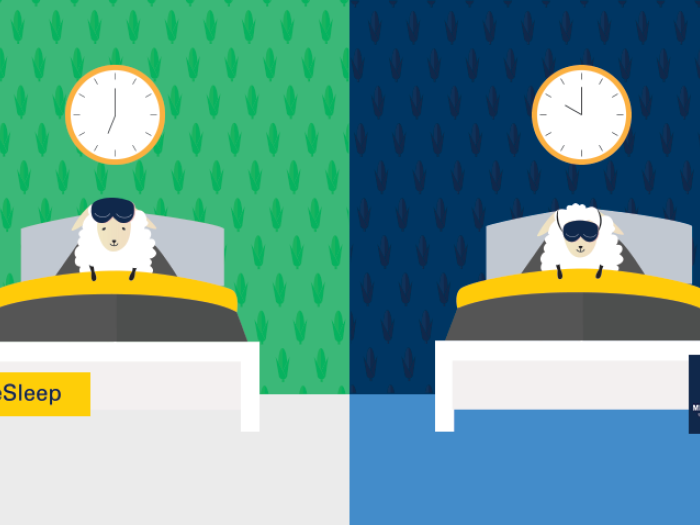Most of us are guilty of streaming countless episodes of a favorite show in one sitting. But the habit can wreak havoc on sleep, research shows.
1:00 PM
Author |

Netflix and other streaming services make it simple to stay up late — just one more episode, really! — to binge on shows such as Stranger Things and Unbreakable Kimmy Schmidt.
But marathon viewing comes at a price: your sleep.
MORE FROM MICHIGAN: Sign up for our weekly newsletter
Even when heavy eyelids beckon, pressing "pause" can be tough.
"We weigh what we think is most important: immediate gratification of finding out what happened to Jon Snow (on Game of Thrones) or an extra hour of sleep," says Jan Van den Bulck, Ph.D., D.Sc., a professor of communication studies at the University of Michigan.
He co-authored a recent study that examined the TV-watching habits of 423 adults ages 18 to 25. Participants also were asked about their sleep quality and levels of fatigue and insomnia.
The results, published in the Journal of Clinical Sleep Medicine, show that most of us are guilty of the occasional screen-time bender: 4 in 5 respondents said they've binge-watched at some point. More than 1 in 10 do it at least once weekly.
Men binged less often than women but reported doing so for longer stretches, the study found.
Perhaps even more telling is that those who binge-watch, male or female, are more likely to adopt the lethargic gait of those pesky Walking Dead zombies than those without the habit. The former group reported higher levels of fatigue and poor-quality sleep.
Notes Van den Bulck: "You can end up in a vicious cycle."
The risks of binge-watching
Exhaustion isn't the only potential side effect from late nights spent in front of a screen.
Poor sleep can increase the risk of major health problems, including heart and kidney disease, type 2 diabetes and stroke. That deficit can affect a person's weight, appearance, memory and emotional state.
SEE ALSO: 5 Tips for Better Sleep (Counting Sheep Not Required)
Nighttime viewing also is a key culprit because televisions, smartphones and tablets emit blue light that suppresses melatonin needed to regulate the body's sleep and wake cycles.
Couple those factors with dramatic storylines and on-demand access to a vast library of titles, and a person could remain overly stimulated before bed, a time when the body should be winding down without screens.
Instead, "people try to go to bed and they haven't relaxed," says Jonathan Barkham, M.D., a clinical instructor of internal and sleep medicine at Michigan Medicine. "They want it to be like a light switch — and then they lay there for an hour and get frustrated."
Barkham, who wasn't involved in the binge-watching study, notes that it helps to turn off the TV two hours before turning in. He adds that reading, making a to-do list or taking a warm bath, among other steps to wind down, can help spark sleep.
Finding a balance
Van den Bulck, who has studied the ties between media use and sleep for 15 years, knows the lure of the evening binge isn't going anywhere. ("Our level of self-control is lowest before we go to bed," he says.)
So, too, does Netflix CEO Reed Hastings, who in April joked that the greatest competitor to the juggernaut streaming service is sleep.
That's why the American Academy of Sleep Medicine in May released guidelines to binge-watch — yes — responsibly.
"You can stream your favorite shows and movies without sacrificing the sleep you need each night," Ronald Chervin, M.D., a Michigan Medicine neurologist and a recent president of the academy, said in a news release that included a list of tips.
Those suggestions are:
-
Set an episode limit each night before watching.
-
Take a break between each episode; don't fall into the "auto-play" trap.
-
Download episodes on your smartphone to control how many you watch in one sitting.
-
Schedule time on the weekend to catch up on your favorite shows.
-
Use one of the apps for your computer, tablet or smartphone that minimizes the effects of blue light after sunset.
-
Stream videos to your television instead of your mobile device at night to reduce exposure to brightly lit, hand-held screens.
-
Avoid using mobile devices while in bed.
-
Turn off all screens at least 30 minutes before bedtime.

Explore a variety of health care news & stories by visiting the Health Lab home page for more articles.

Department of Communication at Michigan Medicine
Want top health & research news weekly? Sign up for Health Lab’s newsletters today!





